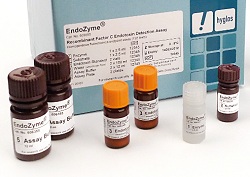A HOMOGENEOUS fluorescence microplate assay using recombinant Factor C derived from horseshoe crab, for measuring endotoxin (Lipopolysaccharides, LPS) in pharmaceuticals, biologics and medical equipment, has been launched by Hyglos.

EndoZyme rFC is a homogeneous fluorescence microplate assay for determination of endotoxins
The EndoZyme assay exploits pioneering work published by Japanese researchers working under Professor Sadaaki Iwanaga.
Recombinant Factor C is the endotoxin-specific principal receptor in the LAL enzyme cascade. In the EndoZyme assay, recombinant Factor C is activated by any endotoxin present in the sample, prompting it to enzymatically cleaves a synthetic substrate – resulting in a fluorescence signal.
EndoZyme promises improved sensitivity and measurement in the range 0.005 to 50EU/ml, with excellent correlation to LAL and no false-positive glucan reaction. The assay uses no animal material, and so presents no threat to the diminishing horseshoe crab population
Lipopolysaccharides (LPS), or endotoxins, are biologically active components (toxins) of the outer cell membrane of all Gram-negative bacteria. Presence of endotoxins in the blood stream causes triggering of the signalling cascade and may lead to endotoxic shock. Endotoxin control is mandatory in the production of some drugs, infusions, and medical devices.
